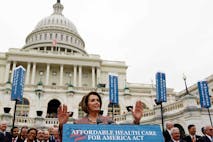Paid family leave is pro-life policy in action. No mama should have to leave her newborn to go back to work just to make ends meet. #SOTU

Paid family leave: A pro-life policy too important to ignore
Opinion·By Anne Marie Williams, RN, BSN
Paid family leave: A pro-life policy too important to ignore
President Biden’s proposed American Families Plan has elicited much debate over a slew of potential government-mandated programs purported to benefit children and families. One component of the Plan is paid family, medical, and sick leave. There are arguably good reasons for at least paid family leave to be a bipartisan issue, and pro-lifers in particular have “skin in the game” when it comes to this specific benefit for children and families.
However, there has been pushback from some critics of government-mandated paid family leave, and there is plenty of room for robust conversation on the best ways to go about implementing paid family leave in response to their specific concerns. Ultimately, however, ensuring paid family leave for families across the country, especially for low-wage earners, should be a priority for the pro-life movement rather than a tangential side-show.
Paid family leave should matter to pro-lifers
The pro-life case in favor of paid family leave is fairly straightforward. As Live Action News has previously noted, financial concerns are routinely cited as a major consideration in women’s abortion decisions, especially when the pregnancy was unplanned. In fact, specific mention is made of “not enough paid family leave” or “no paid family leave” in nearly four in 10 of these cases.
Taking those financial concerns at least temporarily out of the question after the child’s birth or adoption through paid family leave is one measure that could reduce abortions.
In February of 2020, Live Action founder Lila Rose tweeted, “Paid family leave is pro-life policy in action. No mama should have to leave her newborn to go back to work just to make ends meet.” The pro-life position phrased another way might sound like the late Pope St. John Paul II, who said that “true advancement of women requires that labor should be structured in such a way that women do not have to pay for their advancement by abandoning what is specific to them and at the expense of the family.”
What paid family leave does for moms and babies
Mothers and babies stand to gain substantially from increased bonding time without the physical or emotional stresses of job-related concerns nor the financial strain of taking time off without pay. Single mothers and mothers who work in low-wage jobs may stand to gain the most, as Vox reported that only 8% of low-wage workers, often employed in food service, retail, or custodial services, had access to paid family leave. The press release for the Plan noted the disturbing statistic that “Nearly one in four mothers return to work within two weeks of giving birth.” (emphasis added)
Research suggests definite benefits of paid family leave programs. Even the pro-abortion American Medical Association noted, “Increases in paid parental leave were associated with drops in perinatal, neonatal, post-neonatal, infant, and child mortality.” In contrast, as one Newsweek editorial noted, “Parental leave of less than 12 weeks… is associated with increased maternal depression, anxiety, stress, and marital instability.”
This research coincides with the growing attention in recent years to the critical “fourth trimester,” the first months postpartum when the woman is undergoing so many changes and adjustments. In fact, the Harvard Medical School Health blog proposed that the United States’ abnormally high maternal and infant mortality rate in comparison to other developed countries is most likely connected to lack of support for women during the first year postpartum.
READ: Could offering women paid family leave save preborn babies’ lives?
Critics raise concerns
Article continues below
Dear Reader,
In 2026, Live Action is heading straight where the battle is fiercest: college campuses.
We have a bold initiative to establish 100 Live Action campus chapters within the next year, and your partnership will make it a success!
Your support today will help train and equip young leaders, bring Live Action’s educational content into academic environments, host on-campus events and debates, and empower students to challenge the pro-abortion status quo with truth and compassion.
Invest in pro-life grassroots outreach and cultural formation with your DOUBLED year-end gift!
Conservatives have registered several concerns with proposed mandatory paid family leave legislation, mostly centering on the potential negative impact on small and/or locally-owned businesses. Critics argue that such businesses will suffer if they are forced to incur the increased costs, for example, of hiring another employee to administer the new leave program, or of paying out when employees take advantage of the benefit.
The Society for Human Resource Management quoted Senator Richard Burr of North Carolina, who said that “[a] costly new mandate imposing a one-size-fits-all policy… on small businesses… could force businesses to cut jobs.” Burr insisted on “flexibility to help employers make paid leave work” advocating instead of federally-mandated paid family leave for extension of the Tax Cuts and Jobs Act which “offers a federal tax credit to employers that provide paid family and medical leave to their employees.”
We’ve already seen the benefits of paid family leave in these places
Supporters of paid family leave note the positive results seen in the nine states and Washington, D.C., that have already implemented mandatory paid family leave.
Christianity Today summarized the findings. Among them:
Child health has improved even at birth… Infant mortality rates are lower. That may because there’s a reduced level of stress on the mother who’s carrying the child. The mother’s and the child’s health are linked together. Mothers are more able to breastfeed and for a longer period, and more likely to make it to medical appointments. In the case of fathers, fathers who take at least two weeks of parental leave away from work are more likely to be involved in childcare, many months and sometimes years afterward.
The Newsweek editorial found financial incentives to support mandatory paid family leave as well, since “mothers who receive paid leave are 39 percent less likely to receive public assistance and 40 percent less likely to receive food stamps than mothers who do not receive such compensation.” They noted that “in a way that ends up requiring less total spending by the government.”
We can argue over the how
Certainly, there is a place for discussion on how to best implement paid family leave, and supporting paid family leave isn’t necessarily the same as supporting President Biden’s American Families Plan.
An early 2020 article on Breakpoint cited the historical differences between Republican-proposed versus Democrat-proposed paid family leave programs. An Ethics and Public Policy Center (EPPC) event exploring the results of public polling on the topic of paid family leave found areas of general agreement across party lines, including the idea that paid family leave should last no longer than three months, and should be paid for by the employer much like other employer-paid benefits such as short term disability. The website Paid Leave for Families explores what paid family leave looks like from a “budget-neutral proposals and no mandates on business” perspective.
In the end, the payoffs of paid family leave for women and children, especially poor women, are too important for pro-lifers to sit this conversation out.
“Like” Live Action News on Facebook for more pro-life news and commentary!
Live Action News is pro-life news and commentary from a pro-life perspective.
Contact editor@liveaction.org for questions, corrections, or if you are seeking permission to reprint any Live Action News content.
Guest Articles: To submit a guest article to Live Action News, email editor@liveaction.org with an attached Word document of 800-1000 words. Please also attach any photos relevant to your submission if applicable. If your submission is accepted for publication, you will be notified within three weeks. Guest articles are not compensated (see our Open License Agreement). Thank you for your interest in Live Action News!
Read Next

UK lawmaker: Pregnant woman should be allowed to undergo assisted suicide
Right to Life UK
·More In Opinion

Issues
Why more regulation won't solve the ethical IVF crisis
Angeline Tan
·
Guest Column
GUEST OPINION: Why I believe life is always worth saying 'yes' to
Emily Berning
·
Opinion
Can IVF ever be ethical? Here are some things to consider.
Nancy Flanders
·
Opinion
The federal abortion battle testing the pro-life movement
Mark Wiltz
·
Opinion
The Affordable Care Act is unaffordable and morally unacceptable. Americans deserve better.
Mark Wiltz
·More From Anne Marie Williams, RN, BSN

Human Interest
FULL CIRCLE: Nurse practitioner's exodus from abortion industry into true healthcare
Anne Marie Williams, RN, BSN
·
Issues
Could past birth trauma play a role in women’s abortion decisions?
Anne Marie Williams, RN, BSN
·
Analysis
What Denmark can teach us about reducing infant and maternal mortality
Anne Marie Williams, RN, BSN
·
Analysis
Aiding positive birth and postpartum experiences should matter to pro-lifers
Anne Marie Williams, RN, BSN
·
Issues
Life-affirming programs in two different states aim to reduce maternal and infant mortality
Anne Marie Williams, RN, BSN
·